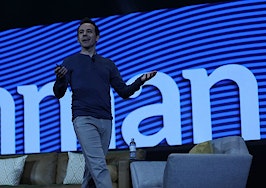This article has been reposted with permission from Mike DelPrete.
The biggest evolution of the iBuyer business model in four years quietly occurred last week: Opendoor and Offerpad launched traditional brokerage listing services. Both companies will now list homes directly, alongside their core instant-offer businesses, underlining the growing convergence of iBuyers and the traditional industry.

The value of seller leads
One of the biggest opportunities in iBuying is monetizing seller leads (consumers who request an offer but don’t sell to an iBuyer). At scale, converting even a portion of these high-intent leads to a traditional listing could be a billion-dollar opportunity.
IBuyers only buy a small fraction of homes from consumers who request offers. In 2019, Zillow bought 6,500 houses of the 264,000 consumers who requested an instant offer (about 2.5 percent). The remaining 257,000 homeowners didn’t sell to Zillow, but many — upward of 40 percent — eventually sold via a traditional listing.

Historically, iBuyers have struggled with converting seller leads. Zillow farms these leads out to its Premier Agent network, and Opendoor has a network of Partner Agents.
It’s a difficult process. Connecting consumers who are interested in an instant sale to a real estate agent feels like a bait-and-switch, and because the partner agents are independent contractors, there’s an inconsistent experience and misaligned incentives.
Launching a listing service is an effort to make a sale on every consumer who enters the funnel. It moves from a “take it or leave it” product choice to presenting consumers the illusion of choice (would you like the instant offer or the traditional sale?), a common sales tactic to increase conversion.
The lines between traditional and disruptor are blurring
It’s not just iBuyers that have evolved their business models. Traditional brokerages are adopting new, disruptive models and making them their own.
Traditional agents and brokers are providing instant offers and “buy before you sell” services alongside their listing services, utilizing startups such as Zavvie and Homeward.
A growing list of brokers have raised capital and have launched their own iBuyer programs — Lamacchia Realty, Matt Curtis Real Estate, and 8z Real Estate — while industry behemoths have launched programs such as Keller Offers, RedfinNow, and Realogy’s RealSure.

Over time, by adding these new tools to their toolboxes, traditional agents are slowly turning into iBuyers themselves — or at least offering their full range of services. New ideas are not the exclusive domain of startups and disruptors; the best ideas are being co-opted by the traditional industry.
Strategic implications
With this move, Opendoor and Offerpad have achieved feature parity with traditional brokerages. They are no longer an option to be considered as an alternative to a traditional listing; they’re a complete solution for any homeowner.
Both Offerpad and Opendoor are acting as their own listing agents, utilizing salaried employees to list and sell homes (exactly how they currently sell thousands of homes purchased from consumers). In some markets, Opendoor is also using partner agents for this new service.
The tendency of disruptors to utilize internal, salaried agent employees is noteworthy. Employees offer a consistent, controlled experience, which yields higher conversion rates for converting seller leads and ancillary services (which is why Redfin’s agent productivity is exponentially higher than the industry average and why fixed-fee brokerage Homie has an 85-plus percent attach rate on its mortgage product).
Ultimately, this new service — which is in the early stages and not fully rolled out — represents a way for iBuyers to make money without having to actually buy houses. After four years and billions of dollars invested into iBuying, it’s a significant adjustment to the core business model.
Mike DelPrete is a strategic adviser and global expert in real estate tech, including Zavvie, an iBuyer offer aggregator. Connect with him on LinkedIn.







